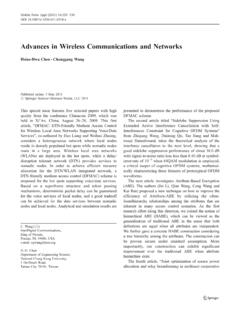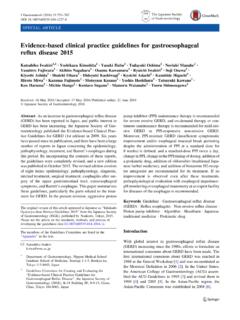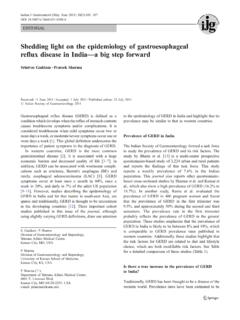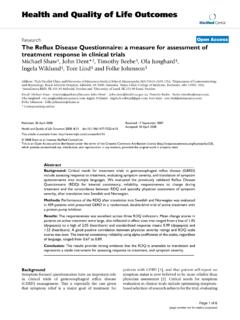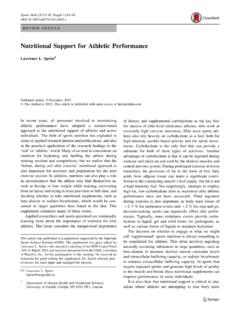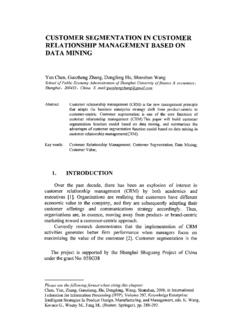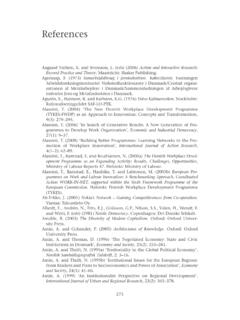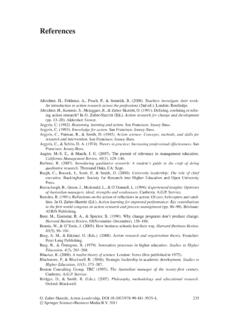Transcription of Globalization Theory: A Post Mortem - Springer
1 Globalization theory : A Post MortemJustin RosenbergInternational Relations and Politics, University of Sussex, Falmer, Brighton BN1 9SN, : Globalization was theZeitgeistof the 1990s. In the social sciences, it gave rise tothe claim that deepening interconnectedness was fundamentally transforming thenature of human society, and was replacing the sovereign state system with a multi-layered, multilateral system of global governance . A decade later, however, theseexpectations appear already falsified by the course of world affairs. The idea of Globalization no longer captures the spirit of the times : the age of Globalization is unexpectedly over. Why has this happened? This article argues that Globaliza-tion theory always suffered from basic flaws: as a general social theory ; as ahistorical sociological argument about the nature of modern international relations;and as a guide to the interpretation of empirical events.
2 However, it also offers analternative, conjunctural analysis of the 1990s, in order both to explain the riseand fall of Globalization itself, and to illustrate the enduring potential forInternational Relations of those classical approaches which Globalization Theoryhad sought to Politics(2005)42,2 74. : Globalization ; Marx; uneven and combined development; historicalsociology; conjunctural analysisContents1. 32. Theoretical Post Mortem .. 11 Globalization and social 11 Globalization and historical 153. Historical Post Mortem .. 26 The nature of conjunctural 29 Social origins of the 40 Inside the 48 The waning of the 594. Conclusion .. 63 International Politics,2005,42, (2 74)r2005 Palgrave Macmillan Ltd 1384-5748/05 $ age of Globalization is was a period in which that wordglobalization, seemed to many people to capture the essence of what was goingon around them.
3 During the 1990s, activists and politicians, journalists andacademics observed the spread of economic liberalization, the rise of newinformation and communication technologies, the increased salience ofinternational organizations, and the resurgence of a cosmopolitan HumanRights agenda; and many of them believed that the world was opening up to anew form of interconnectedness, that a multi-layered, multilateral system of global governance was emerging, which was set to transform the very natureof international politics. Perhaps, in the end, the temporary but realascendancy of this belief marks the only sense in which an age of Globalization could undeniably be said to have existed. But, at any rate, that period has nowpassed. The recent disappearance of this word from Anglo-American mediaand governmental commentaries has been almost as sudden as its meteoric risea decade is not hard to see why this should have happened.
4 After all, the course ofevents in the real world has radically diverged from the historical expectationsassociated with the idea of Globalization . [T]hrough a process of progressive,incremental change, predicted David Held and Anthony McGrew in 1998, geo-political forces will come to be socialized into democratic agencies andpractices (1998, 242). If anything, however, recent international developments including the stymieing of the Kyoto Protocol, the crippling of theInternational Criminal Court, and the multiple crises of the internationalorganizations (UN, NATO, EU) in the run-up to the second Iraq war havebeen dominated by the very opposite process: a vigorous re-assertion of greatpower national interests. And the talk is therefore now more and more of unilateralism and even empire , and less and less of multilateralism and global governance (Cox, 2003).
5 Doubtless, some of those who wrote about Globalization in the 1990s will try to shoe-horn current events back into thatintellectual framework. But it seems likely that they will face an uphill struggle,and a diminishing audience. For the idea of Globalization has now lost thatenormous suggestive power, which derived from its temporary, subjectivecorrespondence to the lived experience of the times. It was that effortlesscorrespondence which made it such a dominant intellectual and cultural motifof the 1990s. Not any more. Globalization today is yesterday suggest that Globalization was aZeitgeistis not to say that the eventsthat generated it were insignificant. The dispute between globalists andsceptics was, as Linda Weiss insisted notabout therealityof change; it [was]about the nature and significance of the changes underway as well as thedriving forces behind them (1999, 59).
6 Huge changes did indeed occur duringJustin RosenbergGlobalization theory : A Post Mortem3 International Politics 2005 42the 1990s. The international system itself underwent a major restructuring. Butthe idea, so current at the time, that underlying this restructuring was a spatio-temporal transformation of human existence, Globalization , which wascarrying us rapidly into a post-Westphalian or even post-international global future, seems now to be passing away. It no longer clearly speaks to what ishappening in international relations. In retrospect it will perhaps increasinglybe seen as a conjunctural phenomenon of the 1990s reflecting, but notexplaining, the experience of those entire academic literature the literature of Globalization theory has arguably been left high and dry by this turn of events. The best-knownnames in that literature included Anthony Giddens, Ulrich Beck, David Held,Tony McGrew, Manuel Castells and Zygmunt Bauman; but it attracted amuch wider following across the social sciences.
7 And what united the variouscontributions to Globalization theory in the end were two distinctive andextremely ambitious claims about the contemporary world and how tounderstand , they argued, Globalization variously manifested in the collapse ofmilitary and ideological divisions, the transnational integration of the world toform a single social space, and the rise of new patterns of deterritorialized social relations enabled by new means of communication was producing afundamental shift in the spatio-temporal constitution of human societies. Andsecond, the consequences of this shift were turning out to be so profound thatthey revealed in retrospect a basic lacuna in the classical tradition of socialtheory. Formulated in an earlier age, when the territorialist basis of social lifewas still intact, that tradition could not discern how much of what it analysedwas in fact contingent upon spatial and temporal orderings of social life whichwould later be transcended.
8 Globalization , it was therefore argued, alsobrought with it the need for a new, post-classical social theory , in which thecategories of space and time would receive the central explanatory role whichthey had always identify Globalization theory in this way, of course, is to focus on oneparticular strand of a vast literature namely, that strand which not onlyemphasized the centrality of growing interconnectedness to late-20th centurysocial change, but also sought to provide the sociological underpinnings for acorresponding revision of social theory itself in line with the nature of thischange. Very few writers, it is true, tried to rise to this challenge. Arguably,however, the work of those who did occupied a strategic position in theliterature as a whole. For it was upon their success or failure that the overallprovenance of the concept of Globalization ultimately depended.
9 Successwould finally anchor the premise which was operative across the field namely that the term Globalization identified the causality involved in afundamental transformation of social existence. Failure would leave it adrift onJustin RosenbergGlobalization theory : A Post Mortem4 International Politics 2005 42the same tide of intellectual fashion which first raised it to prominence, andwithout any independent intellectual ability to hold its position when that it is worth recalling just how ambitious and all-encompassing theseclaims became during the high tide itself. When Martin Albrow (1996, 4) wroteabout the supplanting of modernity by globality , he expressed in its starkestform a common belief that the term Globalization identified a social change ofepochaldimensions. Moreover, when Mike Featherstone and Scott Lashreported that Globalization had now become the central thematic for socialtheory , they described this change as comprising above all else thespatialisation of social theory (1995, 1).
10 Jan Aart Scholte struck a similarchord when he argued that the traditional social sciences had been shaped by a methodological territorialism which prevented them from seeing the reality ofglobalization, and that it was therefore necessary to produce nothing less than a paradigm shift in social analysis (1999, 18). Anthony Giddens implicitlyclaimed to have provided the new paradigm in his problematic of time spacedistanciation , offered as a replacement for existing sociological perspectives (1990, 16). So too did Manuel Castells, whose concept of a network society was designed to illuminate a newly dominant social reality organized aroundthe space of flows and timeless time (Held and McGrew, 2000, 80).Meanwhile, Zygmaunt Bauman proposed nothing less than a rewriting ofhuman history based on what he called the retrospective discovery of thecentrality of spatial distance and speed of communication in the constitution ofall societies (1998, 15).
